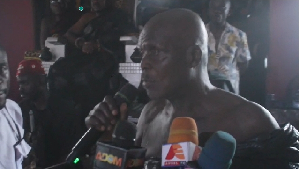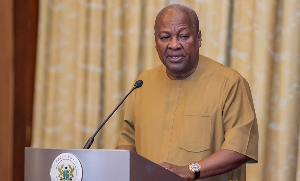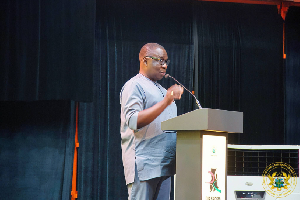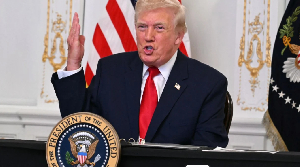By Dr. Michael J.K. Bokor
E-mail: mjbokor@yahoo.com
Tuesday, December 6, 2011
The CPP’s Paa Kwesi Nduom now says that he doesn’t want the press or anybody to refer to him as a “presidential aspirant.” I don’t know what he has seen to warrant this prohibition, but I can say for sure that whether he is described as such or not won’t change matters for the better for him. He seems to have reached a dead-end in his political career and the earlier he resigns himself to fate the better it will be for his image—at least, whatever of it is left for him to keep up.
If there is any single contemporary Ghanaian politician who seems lost, it is none other but this Nduom (and all others in the fractured pro-Nkrumahist political family presenting themselves to Ghanaians as presidential material). I say so without any mischief or disdain; but it is obvious to me that he seems not to know that there are too many odds stacked up against him and that no matter how much money he splashes around campaigning for votes, he can’t win any Presidential election. At least, not in my life time. But like the typical stubborn, self-centered Ghanaian politician, he will not relent. He will end up goring every ox in sight and fail to be at peace with everybody, including himself.
The ongoing rumpus in the CPP makes me wonder whether Nduom and the other wordy warfarers really know why politicians like them give politics a bad name. Or whether they don’t know that in its current configuration, neither they (as individuals) nor their party can ever win political power in Ghana. Or that they are just wasting resources and time, running on a fool’s errand! I have been wondering whether all those who are shouting themselves hoarse for media attention don’t know that they don’t have a dog’s chance to win Presidential elections in Ghana—at least, not in my lifetime, if the drift of Ghana politics is anything to go by in appraising political (mis)fortunes. To be blunt, I am saying that despite all the tons of self-congratulatory noises that Nduom is making all over the place, he can’t win any Presidential elections. As such, why is he bulldozing his way through?
Claims that he is wealthy or the most preferred choice in the CPP (which motivates him to move about and indulge in publicity stunts or to support the party or its functionaries) alone will not win him any massive following to dislodge the incumbent (President Mills) or the NPP’s Akufo-Addo. It takes more than mere material wealth or a self-constituted political clout to attract the electorate.
I single out Nduom for analysis because he is a clear example of the egoistic Ghanaian politicians who are so hampered by personal ambitions as not to know their limitations. The evidence is right in front of their eyes but they can’t see them; or even if they see it, they pretend it’s not there! Such politicians are all over the place, vigorously running a fool’s errand! Don’t tell me that’s the beauty of democracy.
Hindsight: Consider the 19 aspirants who vied for the NPP’s flagbearership before the 2008 elections and you should understand the issues clearly. Indeed, apart from Akufo-Addo and Alan Kyerematen, who had an obviously large following in the party, all the others were non-starters who should have known better not to waste everybody’s time and their own resources to look for the green light. But they didn’t, apparently deceived by their own self-importance to press on till defeat halted their ambitions.
It is not as if going round the country, campaigning for voters’ attention is cheap. How about the resources spent conveying the candidate and his entourage from one place to the other, and the unquantifiable others spent greasing the palms of those who matter in the various communities to be visited? Some even go to the extent of stockpiling material goods such as bicycles, corn-mills, wax prints, toilet soap, and motor cycles, among a tall list of such gifts, to be distributed to voters in the various communities. One wonders where the money for all these items comes from?
More importantly, one wonders what the dividends from such mindless largesse are. By the end of their tours, most of these aspirants lose sleep as they count the cost. But wait a minute. They curse themselves when more demands flow in from places and people that they have already contacted and given their fair share of the bribes.
In what can easily pass for a blackmail, those in the communities following up to demand more accentuate their requests with a veiled warning: “If you don’t give us what we demand, you will not get our votes”; or “We will do all we can to spoil you in our constituency.” Frightened by such a push, the aspirants budge and part with more commodities and cash only to realize that such overtures don’t really win the hearts and minds of the voters. They realize rather too late that all is vanity. But they can’t get back what they willingly gave out as an inducement for votes. Conscience-buying through such means always comes with a high price for them to pay. And they pay it, even if grudgingly. Come the next electioneering period, these same people will be out again on the campaign trail, repeating their folly, even intensifying it. The cycle never ends.
Their conduct may be quickly interpreted as sheer folly, considering many factors. Are these aspirants so blind and deaf that they can’t see or hear anything to conclude that they can’t ever win national elections in Ghana to become what they see themselves as being in Ghana politics? Can they not tell from public opinion about them or from the attendance at the rallies they hold that they don’t have the massive following that other contestants have, and that by all accounts they are not the favourites of the electorate? Or that by their very nature—or the nature of the political parties fielding them—that they are not in the good books of the electorate? In other words, even if they are so full of themselves or overpowered by their egos to not come to terms with reality, can’t they read any deeper meaning into Ghanaian politics to see themselves as underdogs? Do underdogs ever win elections in Ghana for them to deceive themselves that their star will shine one day if they persist in participating in the electioneering processes?
More intriguingly, what exactly is the motivation for their wanting to be in the race, to spend so much money, yet trail miserably at the end of the day—and not learn any lesson to quit but will continue to put themselves forward again to be humiliated? Is it because they think they have a tough skin? What for?
Continued in the next installment…
Opinions of Wednesday, 7 December 2011
Columnist: Bokor, Michael J. K.














